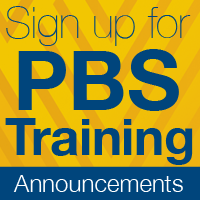
Winter 2019

Download the Winter 2019 Edition of the Support Report

Positive behavior support (PBS) is a package of evidence-based strategies to improve quality of life and decrease challenging behaviors. It teaches people new skills and alternative responses to replace challenging behaviors. This approach is positive, proactive and focuses on preventing challenging behaviors before they occur. There are several key features of PBS:
Person Centered
The hopes, goals and preferences of individuals are at the center of PBS. PBS practitioners help individuals live a life that is meaningful by providing them with opportunities to do the things they love. These opportunities differ from person to person and must be individualized.
Function Based
All behavior, appropriate and inappropriate, has a purpose. This purpose is also called a function. The four functions of behavior are:
- Attention from others
- Access to an item or activity
- Escape/avoidance of something undesirable
- Sensory stimulation
A functional behavior assessment is completed when challenging behaviors occur to determine why they are happening. After the reason for the behavior is determined, the individual is taught a new, more appropriate behavior to replace the challenging behavior.
PBS Turns 30
The PBS program is celebrating 30 years of service! Thank you to everyone who has helped make the program a success over the years.
Proactive
PBS aims to prevent challenging behaviors from occurring by changing surroundings in order to set individuals up for success. Situations that often lead to challenging behavior are identified during the functional behavior assessment. PBS practitioners try to minimize these situations when possible. When this is not possible, the individual is prepared in advance for the situation so they know what to expect and how to respond.
Data Driven
Data tells an important story which drives the PBS process. It tells us how often challenging behavior occurs, where it occurs and when it occurs. Data also helps inform decisions. It is used to evaluate individualized PBS plans and agency action plans to determine if the plan is working or needs changes.
Collaborative
PBS uses a team-based approach. This team does not have to be a formal team that is already established. It may include family members, friends, classroom aides, direct care staff or other people who know the individual well. The team provides valuable information during the functional behavior assessment, collects data and implements strategies outlined in the behavior support plan.
Trainings Coming Spring 2019:
PBS Direct Care Overview Trainer Training – Flatwoods Filling the MAP (Making Action Plans) Gap: How-To’s and Essentials – Morgantown and Charleston Visit http://pbs.cedwvu.org/pbs-trainings/ for additional details.
What is Positive Behavior Support (PBS)?
Positive behavior support is a package of evidence-based strategies to improve quality of life and decrease challenging behaviors. It teaches people new skills and alternative responses to replace challenging behaviors. This approach is positive, proactive and focuses on preventing challenging behaviors before they occur.
Purpose of the PBS Program
The purpose of the PBS Program is to build workforce capacity to support individuals who have challenging behaviors. Intensive and collaborative work is completed with agencies who serve people with intellectual and developmental disabilities, traumatic brain injuries and other complex support needs to implement PBS system wide. Through a person-centered approach, supportive, motivating and inclusive environments for individuals with complex needs are promoted.
Overview of Program Activities
The following program activities can help you prevent and improve challenging behaviors:
System-Wide PBS
- Intensive collaboration that includes training, technical assistance, and coaching
- Establish and sustain three-tiered PBS approach
Technical assistance and mentoring
- Guidance and feedback to professionals
- Solutions for challenging behaviors
Person-centered planning
- Develop personal goals
- Create an action plan for achieving goals
Short-term individual assistance
- Serve a very limited number of individuals and families statewide
- Individuals must have dangerous behaviors and no services in place to address them
Training and continuing education opportunities
- Limited number of trainings offered for professionals
- Social work CEU's

